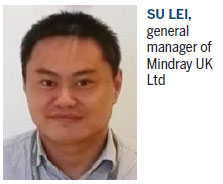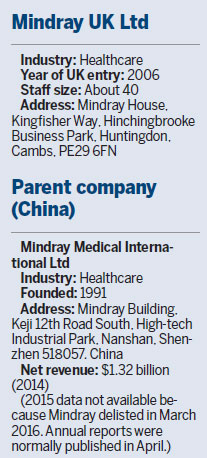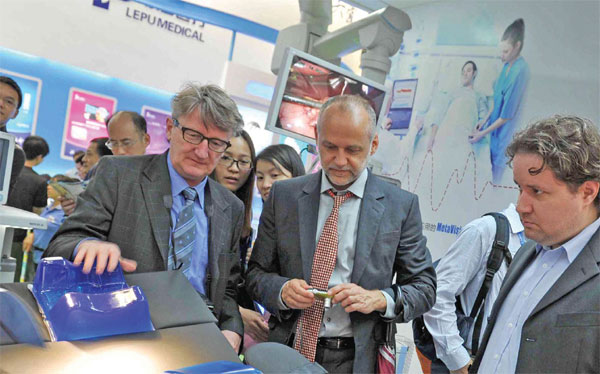China's Mindray pins its UK future on quality, innovation
Go-ahead medical manufacturer's ambition is to take over as one of the nation's market leaders
After just a decade in the United Kingdom, Chinese medical manufacturer Mindray has risen to become the third-largest supplier of patient monitoring equipment in the country, supplying more than half the UK's estimated 700 public hospitals.
Yet the Chinese company retains its towering ambitions. It wants to rival the two market leaders, GE and Philips, to become No 2 in the UK in next three years.
"Our strategy is to maintain product quality, constantly innovate through research and development and strengthen our brand image," says Su Lei, general manager of Mindray UK Ltd.
|
Visitors look at Mindray's equipment at China International Medical Equipment Fair in Shenzhen, Guangdong province. Yu Ge / For China Daily |
Su, who joined the company in 2007, witnessed the challenging but rewarding journey of Mindray in the UK.He remembers an early time when he visited UK hospital procurement teams and no one knew the name of the company.
Its reputation was boosted in 2008 when the UK's National Health Service accepted it into its official procurement system, and now it is highly regarded as a provider of quality equipment to the UK's medical industry - a significant achievement considering the medical industry is generally a conservative one, and hard for newcomers to break into.
"It was challenging to enter a market for the first time, but we're proud of our achievement," Su says.

Looking back, Su sees that Mindray's hard work in the UK paid off because the UK is a market too large to ignore and because carving out a foothold there built a reputation the company could used to expand internationally.
When asked what made Mindray so successful, Su says the key is a commitment to research and development.
Every year 10 percent of sales revenue is reinvested in R&D, and the company encourages overseas sales staff to directly communicate with engineers in Shenzhen, so that market needs can be quickly turned into new products or improvements.
With R&D high on the company's group-level agenda, it often incorporates trends it sees over the next 5 to 10 years into the process.
For example, it has modified its equipment in recent years in response to the National Health Service emphasis on data and information integration. This new focus means patient monitoring machines need to update themselves to automatically transfer data to patients' records. Traditionally, a medical staff member would need to read out the data and transcribe it into patient records, which is more costly and prone to error.
But R&D is not just about major innovation: Even slight changes to a product can make a big difference in the user experience, Su says. He gives the example of a contact screen on patient monitoring machines, where Mindray's machines can help clients to more easily navigate the menu screen and make the desired selections easily.
Mindray was founded in Shenzhen in 1991 as a trade company selling medical equipment produced by foreign companies in China.

But co-founders Xu Hang and Li Xiting, who were engineers at a State-owned maker of medical instruments in the 1980s, had loftier ambitions. They wanted the company to one day produce its own medical equipment.
Mindray invested heavily in research and development and successfully came up with China's first patient monitoring device in 1992.
In the late '90s Mindray realized that China's medical equipment market was limited compared with advanced economies such as Europe and the United States.
To prepare for international expansion, Mindray began making products to international regulatory standards. Most of its products have the CE mark - the French "Conformite Europeenne" - that is mandatory for health, safety and environmental protection products sold in the European Union. Some of its products have received US Food and Drug Administration clearance.
From the early 2000s, Mindray started selling products in the UK through distributors, and manufacturing for other brands as an original equipment manufacturer, or OEM, supplier. But it soon decided to establish subsidiaries overseas and focus on branding its own products.
"We realized that to build a brand with proper recognition, we need to have a local presence," Su says.
In 2004 Mindray established an office in the US, and two years later opened in the UK. Its European network has since expanded to cover the Netherlands, Germany, Italy, France, Spain and Poland. Its products are all made in China and shipped to the company's European logistics center in the Netherlands before distribution to each individual country.

Mindray was listed on the New York Stock Exchange in 2006, raising $311 million, the largest initial offering in the global healthcare industry over the previous two years. The publicity provided an international boost to Mindray's brand.
In March this year, Mindray delisted from the American exchange after completing a $1.9 billion privatization deal. It can now be listed in China's domestic stock exchanges with the aim of achieving higher valuation.
Another milestone for Mindray's overseas expansion was its $200 million acquisition of New Jersey-based Datascope's patient monitoring business in 2008, which turned the company into the third-largest player in the global monitoring device industry.
Datascope's R&D center in Stockholm, Sweden, became a valuable asset for Mindray. The deal also gave it a direct sales force in Europe and North America, whereas before the acquisition it was selling through distributors.
Despite the company's tremendous growth in the UK already, Su says it still has challenging days ahead to rival Philips and GE, because both of those firms have decades of history in the UK. Three to four generations of doctors and nurses trained using their machines, meaning that when it's time to choose, they pick what they are familiar with.
To plant a good image in young medical professionals' minds, Mindray is keen to sell to many more teaching hospitals in the UK. Already it is supplying Royal Edinburgh Hospital, Norfolk and Norwich University Hospitals, King's College Hospital and Bradford Teaching Hospitals.
Su, who came to the UK originally in 2002 for PhD studies at the University of Surrey, saw the team expand to about 40 employees after he joined the company. And he watched the UK subsidiary's functions expand to include sales, marketing and after-sales support.
"I feel lucky to be a part of this rapidly expanding team," he says.
cecily.liu@mail.chinadailyuk.com
( China Daily European Weekly 10/28/2016 page29)























